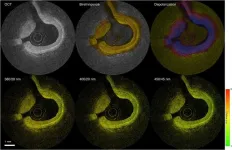(Press-News.org) The Lundbeck Foundation has announced the recipients of The Brain Prize 2024, the world’s largest award for outstanding contributions to neuroscience. This year’s award recognizes the pioneering work of three leading neuroscientists – Professor Larry Abbott at Columbia University (USA), Professor Terrence Sejnowski at the Salk Institute (USA), and Professor Haim Sompolinsky at Harvard University (USA) and the Hebrew University (Israel).
Theoretical and computational neuroscience permeates neuroscience today and is of increasingly growing importance. The winners of The Brain Prize 2024 have made pioneering contributions to these scientific areas by uncovering some of the principles that govern the brain’s structure, function, and the emergence of cognition and behaviour.
Chair of The Brain Prize Selection Committee, Professor Richard Morris, explains the reasoning behind this year’s award:
“It is inconceivable to imagine modern brain sciences without the concomitant development ofn computational and theoretical neuroscience. The three scientists have applied novel and sophisticated approaches from physics, mathematics, and statistics to study the brain. They have developed vital tools for the analysis of highly complex datasets acquired by modern day experimental neuroscientists. The three prize winners have also proposed conceptual frameworks for understanding some of the brain’s most fundamental processes such as learning, memory, perception and how the brain generates maps of the external world. They have also provided crucial new insights into what may go awry in several devastating disorders of the nervous system, such as epilepsy, Alzheimer’s disease, and schizophrenia. In addition, their scientific achievements have paved the way for the development of brain-inspired artificial intelligence, one of the emerging and transformational technologies of our time. ”
On behalf of the Lundbeck Foundation, CEO Lene Skole extends her warmest congratulations to each of the three Brain Prize recipients:
“Their pioneering research has created trailblazing knowledge and paved the way for other scientists to better understand critical brain functions, also in relation to diseases. It aligns fully with our purpose of bringing discoveries to lives. Each of their scientific endeavours began in the 70’s, and their determination, courage and persistence over decades should serve as inspiration for other scientists, and indeed be rewarded.”
END
Pioneering work in computational and theoretical neuroscience is awarded the world’s largest brain research prize
The Brain Prize 2024 worth €1.3 million is awarded to: Larry Abbott (USA), Terrence Sejnowski (USA), and Haim Sompolinsky (Israel/USA) for their Foundational work in Computational and Theoretical Neuroscience.
2024-03-05
ELSE PRESS RELEASES FROM THIS DATE:
New cardiovascular imaging approach provides a better view of dangerous plaques
2024-03-05
WASHINGTON — Researchers have developed a new catheter-based device that combines two powerful optical techniques to image the dangerous plaques that can build up inside the arteries that supply blood to the heart. By providing new details about plaque, the device could help clinicians and researchers improve treatments for preventing heart attacks and strokes.
Atherosclerosis occurs when fats, cholesterol and other substances accumulate on the artery walls, which can cause these vessels to become thick ...
BU study finds robotic-assisted surgery for gallbladder cancer as effective as traditional surgery
2024-03-05
(Boston)—Each year, approximately 2,000 people die annually of gallbladder cancer (GBC) in the U.S., with only one in five cases diagnosed at an early stage. With GBC rated as the first biliary tract cancer and the 17th most deadly cancer worldwide, pressing attention for proper management of disease must be addressed. For patients diagnosed, surgery is the most promising curative treatment. While there has been increasing adoption of minimally invasive surgical techniques in gastrointestinal malignancies, including utilization of laparoscopic ...
We know the Arctic is warming -- What will changing river flows do to its environment?
2024-03-05
AMHERT, Mass.– Scientists at the University of Massachusetts Amherst recently combined satellite data, field observations and sophisticated numerical modeling to paint a picture of how 22.45 million square kilometers of the Arctic will change over the next 80 years. As expected, the overall region will be warmer and wetter, but the details—up to 25% more runoff, 30% more subsurface runoff and a progressively drier southern Arctic, provides one of the clearest views yet of how the landscape will respond to climate change. The results were published in the journal The Cryosphere.
The Arctic is defined ...
BU researcher examines clinicians’ attitudes towards major changes from the 2020 ACS Cervical Cancer Screening Guidelines
2024-03-05
(Boston)—Nearly all cervical cancers are caused by the human papillomavirus (HPV). New evidence has led to dramatic changes in cervical cancer screening recommendations over the past 20 years. In 2020, the American Cancer Society (ACS) released updated guidelines for cervical cancer screening. The main changes to current practices were to initiate screening at age 25 instead of age 21 and to screen using primary HPV testing rather than cytology (PAP test) alone or in combination with HPV testing. Since adoption of guidelines often occurs slowly, understanding clinician attitudes is important ...
The Arctic could become ‘ice-free’ within a decade
2024-03-05
The Arctic could see summer days with practically no sea ice as early as the next couple of years, according to a new study out of the University of Colorado Boulder.
The findings, published March 5 in the journal Nature Reviews Earth & Environment, suggest that the first ice-free day in the Arctic could occur over 10 years earlier than previous projections, which focused on when the region would be ice-free for a month or more. The trend remains consistent under all future emission scenarios.
By ...
Habitual short sleep duration, diet, and development of type 2 diabetes in adults
2024-03-05
About The Study: In this study involving 247,000 UK residents, habitual short sleep duration was associated with increased risk of developing type 2 diabetes. This association persisted even among participants who maintained a healthy diet. To validate these findings, further longitudinal studies are needed, incorporating repeated measures of sleep (including objective assessments) and dietary habits.
Authors: Christian Benedict, Ph.D., of Uppsala University in Uppsala, Sweden, is the corresponding author.
To access the embargoed study: Visit our For The Media website at this link https://media.jamanetwork.com/
(doi: ...
Screen time, sociodemographic factors, and psychological well-being among young children
2024-03-05
About The Study: In this multiyear cross-sectional study of a representative sample of young children in the U.S., the increased prevalence of high screen time in 2020 returned to pre-pandemic levels in 2021; however, it remained elevated in children living in poverty. Two hours or more of daily screen time was associated with lower psychological well-being among preschool-aged children.
Authors: Soyang Kwon, Ph.D., of Northwestern University in Chicago, is the corresponding author.
To access the ...
Too little sleep raises risk of type 2 diabetes
2024-03-05
Adults who sleep only three to five hours a day are at higher risk of developing type 2 diabetes. This is demonstrated in a new study from Uppsala University, published in JAMA Network Open. It also shows that chronic sleep deprivation cannot be compensated by healthy eating alone.
“I generally recommend prioritising sleep, although I understand it’s not always possible, especially as a parent of four teenagers,” says Christian Benedict, Associate Professor and sleep researcher at the Department of Pharmaceutical Biosciences at Uppsala University and leading researcher behind the study.
He and a team of researchers have examined the link between type 2 ...
Toward understanding sperm quality
2024-03-05
A novel screening system developed at Kyoto University enables researchers to investigate sperm cell development and health at the molecular level. The new approach, published in Cell Genomics, promises breakthroughs in male contraception and infertility treatments.
The study, led by Professor Jun Suzuki of the Institute for Integrated Cell-Material Sciences (iCeMS), addresses a critical gap by directly targeting genes within testicular cells inside living organisms. Utilizing a genetic tool called CRISPR, which can ...
Game-changing sensor unveiled for spotting chemical threats
2024-03-05
Scientists have unveiled a groundbreaking sensor that can wirelessly detect chemical warfare agents, marking a significant leap in public safety technology. This innovative device, capable of identifying substances like dimethyl methylphosphonate (DMMP), offers a new level of efficiency and reliability in monitoring and responding to chemical threats, without the need for direct power sources or physical connections.
The urgent need for advanced detection of chemical warfare agents (CWAs) to ensure global security has led to the development of a novel gas sensor. This sensor is distinguished ...
LAST 30 PRESS RELEASES:
Brainwaves of mothers and children synchronize when playing together – even in an acquired language
A holiday to better recovery
Cal Poly’s fifth Climate Solutions Now conference to take place Feb. 23-27
Mask-wearing during COVID-19 linked to reduced air pollution–triggered heart attack risk in Japan
Achieving cross-coupling reactions of fatty amide reduction radicals via iridium-photorelay catalysis and other strategies
Shorter may be sweeter: Study finds 15-second health ads can curb junk food cravings
Family relationships identified in Stone Age graves on Gotland
Effectiveness of exercise to ease osteoarthritis symptoms likely minimal and transient
Cost of copper must rise double to meet basic copper needs
A gel for wounds that won’t heal
Iron, carbon, and the art of toxic cleanup
Organic soil amendments work together to help sandy soils hold water longer, study finds
Hidden carbon in mangrove soils may play a larger role in climate regulation than previously thought
Weight-loss wonder pills prompt scrutiny of key ingredient
Nonprofit leader Diane Dodge to receive 2026 Penn Nursing Renfield Foundation Award for Global Women’s Health
Maternal smoking during pregnancy may be linked to higher blood pressure in children, NIH study finds
New Lund model aims to shorten the path to life-saving cell and gene therapies
Researchers create ultra-stretchable, liquid-repellent materials via laser ablation
Combining AI with OCT shows potential for detecting lipid-rich plaques in coronary arteries
SeaCast revolutionizes Mediterranean Sea forecasting with AI-powered speed and accuracy
JMIR Publications’ JMIR Bioinformatics and Biotechnology invites submissions on Bridging Data, AI, and Innovation to Transform Health
Honey bees navigate more precisely than previously thought
Air pollution may directly contribute to Alzheimer’s disease
Study finds early imaging after pediatric UTIs may do more harm than good
UC San Diego Health joins national research for maternal-fetal care
New biomarker predicts chemotherapy response in triple-negative breast cancer
Treatment algorithms featured in Brain Trauma Foundation’s update of guidelines for care of patients with penetrating traumatic brain injury
Over 40% of musicians experience tinnitus; hearing loss and hyperacusis also significantly elevated
Artificial intelligence predicts colorectal cancer risk in ulcerative colitis patients
Mayo Clinic installs first magnetic nanoparticle hyperthermia system for cancer research in the US
[Press-News.org] Pioneering work in computational and theoretical neuroscience is awarded the world’s largest brain research prizeThe Brain Prize 2024 worth €1.3 million is awarded to: Larry Abbott (USA), Terrence Sejnowski (USA), and Haim Sompolinsky (Israel/USA) for their Foundational work in Computational and Theoretical Neuroscience.






